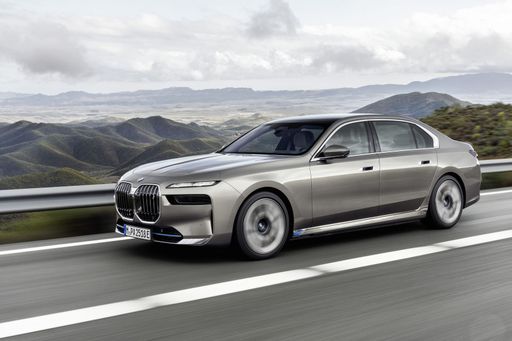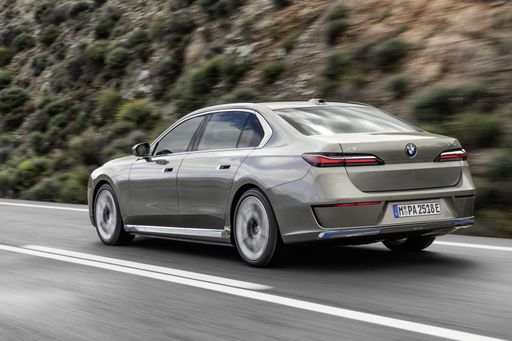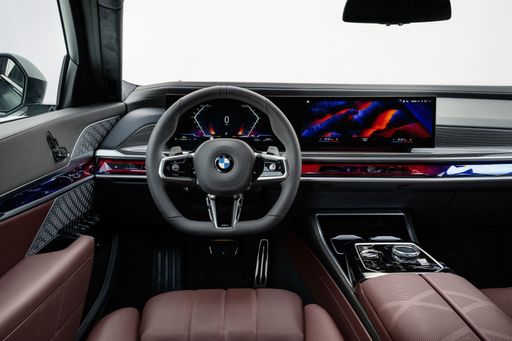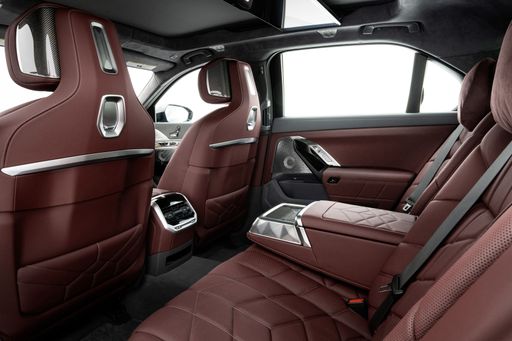BMW i7 VS Ford Transit Connect
BMW i7
The new BMW i7 epitomises luxury and innovation, seamlessly blending advanced technology with elegant design. Its interior offers an unparalleled experience, with premium materials and cutting-edge features that create a tranquil yet engaging atmosphere for both driver and passengers. The i7's performance is both dynamic and efficient, demonstrating BMW's commitment to sustainable driving without compromising on the exhilarating drive the brand is known for.
more informationFord Transit Connect
The Ford Transit Connect is a versatile compact van that seamlessly combines functionality with a comfortable driving experience. Its spacious interior is designed to accommodate both passengers and cargo, making it an ideal choice for small businesses and active families alike. With its efficient engine and agile handling, the Transit Connect offers a reliable and economical option for urban and suburban driving.
more information @ press.bmwgroup.com
@ press.bmwgroup.com
 @ press.bmwgroup.com
@ press.bmwgroup.com
 @ press.bmwgroup.com
@ press.bmwgroup.com
 @ press.bmwgroup.com
@ press.bmwgroup.com
Costs and Consumption |
|
|---|---|
|
Price
about 99200 - 155800
£
|
Price
about 26200 - 41500
£
|
|
Consumption L/100km
-
|
Consumption L/100km
-
|
|
Consumption kWh/100km
18.5 - 20.8
kWh
|
Consumption kWh/100km
-
|
|
Electric Range
559 - 623
km
|
Electric Range
-
|
|
Battery Capacity
101.7
kWh
|
Battery Capacity
19.7
kWh
|
|
co2
0
g/km
|
co2
-
|
|
Fuel tank capacity
-
|
Fuel tank capacity
50
L
|
Dimensions and Body |
|
|
Body Type
Sedan
|
Body Type
Cargo Van
|
|
Seats
5
|
Seats
2 - 5
|
|
Doors
4
|
Doors
4
|
|
Curb weight
2595 - 2770
kg
|
Curb weight
-
|
|
Trunk capacity
500
L
|
Trunk capacity
-
|
|
Length
5391
mm
|
Length
4500 - 4868
mm
|
|
Width
1950
mm
|
Width
1855
mm
|
|
Height
1544
mm
|
Height
1856 - 1860
mm
|
|
Payload
480 - 535
kg
|
Payload
-
|
Engine and Performance |
|
|
Engine Type
Electric
|
Engine Type
Diesel, Plugin Hybrid
|
|
Transmission
Automatic
|
Transmission
Manuel, Automatic
|
|
Transmission Detail
Reduction Gearbox
|
Transmission Detail
Manual Gearbox, Automat. Schaltgetriebe (Doppelkupplung)
|
|
Drive Type
Rear-Wheel Drive, All-Wheel Drive
|
Drive Type
Front-Wheel Drive
|
|
Power HP
455 - 660
HP
|
Power HP
102 - 150
HP
|
|
Acceleration 0-100km/h
3.7 - 5.5
s
|
Acceleration 0-100km/h
11.4 - 13.5
s
|
|
Max Speed
205 - 250
km/h
|
Max Speed
175 - 186
km/h
|
|
Torque
650 - 1100
Nm
|
Torque
280 - 350
Nm
|
|
Number of Cylinders
-
|
Number of Cylinders
4
|
|
Power kW
335 - 485
kW
|
Power kW
75 - 110
kW
|
|
Engine capacity
-
|
Engine capacity
1498 - 1968
cm3
|
|
Top speed
205 - 250
km/h
|
Top speed
175 - 186
km/h
|
General |
|
|
Model Year
2022 - 2023
|
Model Year
2024
|
|
CO2 Efficiency Class
A
|
CO2 Efficiency Class
-
|
|
Brand
BMW
|
Brand
Ford
|
BMW i7
The Pinnacle of Electric Luxury: BMW i7
Introducing the BMW i7, the latest in electric innovation from one of the world's premier automobile manufacturers. Blending cutting-edge technology with luxurious comfort, the i7 represents a significant leap forward in the electric vehicle (EV) market. This article delves into the technical specifications and innovative features that set the BMW i7 apart from its competitors.
Powerful Electric Performance
Under the sleek exterior of the BMW i7 lies a powerhouse of electric capabilities. Depending on the model configuration, the i7 offers between 455 and 660 PS, with a torque of up to 1100 Nm. This ensures an exhilarating driving experience, whether you choose the rear-wheel drive or all-wheel drive configuration. The acceleration is equally impressive, with the i7 capable of going from 0 to 100 km/h in just 3.7 to 5.5 seconds.
Efficient Energy Consumption
The efficiency of the BMW i7 is noteworthy, with an energy consumption ranging from 18.5 to 20.8 kWh/100 km. This efficiency, combined with a substantial battery capacity of 101.7 kWh, gives the i7 an electric range of between 559 and 623 kilometres. BMW’s commitment to sustainability is further underscored by its zero CO2 emissions, reinforcing its status as a premium yet environmentally conscious choice.
Sophisticated Interior and Technology
Inside, the BMW i7 is the epitome of luxury. With seating for five, the interior exudes elegance and comfort. Advanced technology is at your fingertips with features such as the latest iDrive system, providing seamless connectivity and enhanced control over vehicle functions. The i7 ensures you travel in style with its sophisticated Design Pure Excellence, M Sport package, and M Sport package Pro interior trims.
Dimensions and Capacity
The i7’s ample dimensions – with a length of 5391 mm, width of 1950 mm, and height of 1544 mm – are matched by its generous luggage capacity of 500 litres, ensuring practicality alongside luxury. The car's robust build is complemented by a payload capacity of between 480 to 535 kg, ensuring the i7 is as functional as it is stylish.
Cost and Efficiency
With prices ranging from €115,700 to €181,800, the i7 is positioned as a high-end vehicle offering value through its advanced features and performance. The monthly operating costs range between €2,143 and €3,027, while the cost per kilometre is approximately 85.7 to 121.1 cents. Despite its upscale market positioning, the i7 offers competitive efficiency with its remarkable CO2 emission-free driving and energy-saving technologies.
Conclusion
The BMW i7 stands as a testament to the brand’s innovation and dedication to sustainable luxury. By marrying performance, efficiency, and cutting-edge technology, BMW has ensured that the i7 not only meets but exceeds the expectations of discerning EV enthusiasts. The i7 is not merely a car; it is a statement of intent in the future of sustainable luxury. Experience the future today with the BMW i7.
Ford Transit Connect
The Versatile Ford Transit Connect: An In-Depth Overview
The Ford Transit Connect has long been a staple in the light commercial vehicle market. Renowned for its versatility, efficiency, and robust build, this model offers a variety of configurations to suit different business needs. In this article, we delve into the technical specifications and innovative features of the latest iteration of this ever-popular vehicle.
Powerful Engine Options and Performance
Under the bonnet, the Ford Transit Connect offers a range of powerful and efficient engines. The standard diesel options include the robust 2.0 EcoBlue Diesel engines, available with either manual or automatic transmissions. For those seeking a greener option, the Transit Connect also offers a 1.5 EcoBoost PHEV Plug-In Hybrid with a 150 PS output. This array of options ensures that drivers can choose a powertrain that best suits their performance requirements and environmental considerations.
Advanced Design and Dimensions
In terms of design, the Transit Connect is engineered for practicality without sacrificing aesthetics. Measuring between 4500 mm and 4868 mm in length, and 1855 mm in width, it is well-suited for urban environments while offering ample cargo space. The vehicle’s height spans from 1856 mm to 1860 mm, providing a spacious interior that is both comfortable and functional for drivers and passengers alike.
State-of-the-Art Features and Specifications
Technology and convenience feature prominently in the Transit Connect’s offerings. The latest model includes refined details and equipment lines like Limited, Trend, and the more feature-rich Active Automatik. Its advanced infotainment system, safety features, and driver assistance technologies work harmoniously to enhance both driving experience and passenger safety.
Additionally, the vehicle boasts a battery capacity of 19.7 kWh in the hybrid variant, enabling impressive electric-only ranges for day-to-day journeys. The inclusion of dual-clutch automatic transmission in certain models significantly enhances driving dynamism and reduces fuel consumption.
Fuel Economy and Driving Range
The Transit Connect impresses with its fuel economy, particularly in its hybrid iteration. With a fuel tank size of 50 litres and the efficiency of hybrid technology, the vehicle assures drivers of fewer stops at filling stations and more time spent on the road. Despite its commercial nature, it manages to achieve competitive emission figures, an important factor for eco-conscious businesses.
Versatility in Configuration
One of the standout features of the Ford Transit Connect is its adaptability. Available in different configurations, this model can accommodate between two and five passengers, making it suitable for both cargo transport and passenger services. Its flexibility extends to the range of available options for customisation, ensuring it can be configured for various business and personal needs.
Conclusion
The Ford Transit Connect continues to lead the market with its blend of robust performance, innovative features, and adaptability. Whether used for urban delivery, passenger transport, or any number of other commercial applications, the Transit Connect fulfills its role effectively, embodying Ford’s commitment to quality and performance.
With its combination of traditional internal combustion and hybrid powertrains, the Transit Connect addresses both modern environmental concerns and longstanding demand for reliable utility workhorses, making it a noteworthy option for businesses and families alike.
